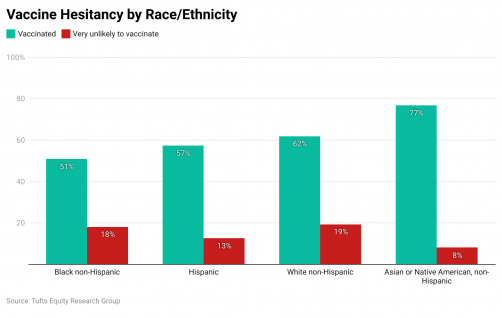Graph courtesy of Tufts University
White people are more likely to have been vaccinated than Black people despite similar levels of vaccine hesitancy, or saying they are very unlikely to get a vaccine. Therefore, access to vaccines and other factors could be limiting vaccination efforts, according to a new, nationally representative study from the Tufts University Research Group on Equity in Health, Wealth and Civic Engagement.
Compared to other adult Americans, vaccine-hesitant people are younger, have less education and are more likely to trust former President Donald Trump. The study indicates that vaccine-hesitancy and access are both limiting factors in overall vaccination rates, and that these factors differ by race.
About 17 percent of the U.S. adult population currently say they are “very unlikely” to get a vaccination for COVID-19, according to the researchers.
This nationally representative survey by Ipsos, using its KnowledgePanel, for the Tufts research group was fielded online between April 23 and May 3, 2021 and had 1,449 respondents.
Major findings include:
Sixty percent of respondents say they have already received the COVID-19 vaccine. This is similar to the CDC’s estimate of 57.4% for the adult population (as of May 7).
Among those not already vaccinated, 28.5% say they plan to get the vaccine and 39.5% say they are very unlikely to, with the rest unsure. The fact that nearly 40% of those not yet vaccinated are very unlikely to get the vaccine has important implications for public health efforts.
People who say that they are somewhat or very unlikely to get vaccinated give a wide array of reasons, of which the most common are concern about long-term effects (28%) and a belief that the issue has been politicized (19%). Of those who say they are very unlikely to vaccinate, 24% say that they believe they had COVID-19 at some point or else once tested positive for the virus.
Vaccine hesitancy varies by race and ethnicity. White respondents and African American respondents are about equally hesitant, with about 18-19% indicating that they are “very unlikely” to take the vaccine. Hispanic and Asian respondents are less likely to say this.
Older people are more likely to be vaccinated and less likely to be hesitant. Eighty-two percent of people 75 and older report being vaccinated. Younger adults (18-35) are the most hesitant.
Levels of vaccination rise, and vaccine hesitancy falls, with education. Adults with a master’s degree or higher are almost twice as likely to be vaccinated as those with a high school diploma or less.
When it comes to who people trust to provide reliable information about COVID-19, the largest number of people say they trust doctors and official health authorities, followed by President Joe Biden. Among media outlets, local television stations and newspapers are most trusted, and Fox News is least trusted (14%). Eighteen percent trust Trump. Three of these sources of information associations with vaccine status: doctors, government websites, and Trump. Of those who trust their doctors or government websites (such as the CDC) “completely,” 86-87% are already vaccinated and less than 2% say they are very unlikely to vaccinate. Of those who say they trust Trump completely, 34% are vaccinated and 48.5% are very unlikely to vaccinate.
“Our finding that white people are more likely to have been vaccinated than Black people, despite similar levels of vaccine hesitancy, illustrates critical issues around vaccine equity,” said Jennifer Allen, a professor of community health in the School of Arts and Sciences at Tufts University and an expert on vaccine hesitancy. “Making the vaccine easily accessible in communities that have experienced a disproportionate burden of COVID infections and deaths is vital. Without this, inequities will be made worse.
“Offering mobile clinics to reach those who are amenable to taking the vaccine is critical,” she added. “In some localities, financial and other forms of incentives are being offered for those who are not opposed to vaccination, but who may need a nudge to get vaccinated. These are the types of new approaches that are sorely needed at this point to get as many people vaccinated as possible.”
“Much work remains to be done to achieve herd immunity in the U.S., especially now that the COVID-19 variants circulating across the country merit vaccination rates of at least 80%,” said Tom Stopka, an associate professor of public health and community medicine at Tufts University School of Medicine and infectious disease epidemiologist. “Innovative public health interventions are needed to help increase vaccination coverage broadly, with a particular focus on younger people, communities of color, and specific political groups that are at higher risk for acquiring and transmitting the virus.”
Source: Tufts University

Be the first to comment on "Survey Says Despite Similar Levels of Vaccine Hesitancy, White People More Likely to Be Vaccinated Than Black People"